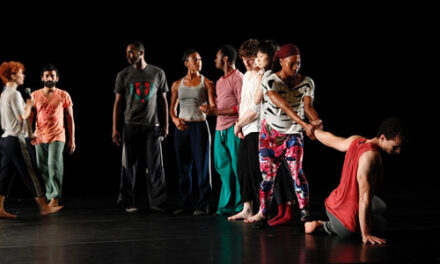Die Zauberflöte (The Magic Flute), Mozart’s final opera (actually a singspiel, since it has spoken dialogue) is a curious blend of Enlightenment ideals and Masonic mysticism, colored by Egyptian religion, with a good dose of sexism and racism thrown in. Maybe it’s all just a fantasy tale, and one shouldn’t look too deeply for a serious message. In the War Memorial Auditorium, the Greensboro Opera Company‘s production of this classic certainly played toward the whimsical side of this theatre piece in which the sun opposes the night, men are superior to women, and some characters even happily find a mate.
Mozart’s music, of course, creates every mood and character. The Greensboro Symphony Orchestra, led by the Opera’s Artistic Director/Conductor Valéry Ryvkin, played the pants off the score. The Overture set the mood in high spirits, and brisk tempi helped move the music throughout the evening. And the lightshow began — showing DNA molecules? These changing projections would add motion and color to the simple but functional stage throughout both acts. To my mind, the lightshow was a cross of Fantasia, The Matrix, and a Fillmore rock concert.
The opening scene finds the hero, Tamino (an Egyptian prince, sung by Scott Ramsay) fighting a serpent (acted by Andrew Smith-Tomlinson). Tamino is saved by the Three Ladies who were adorned in dresses that might have evoked Mozart’s time. Ramsay sang the lead role with feeling and emotion, although occasionally the listener worried that he might not make all of the high notes. Amy Van Looy, Melissa Larkin and Jennifer Gaspar (the Three Ladies) sang solo and in ensemble quite well.
Tyler Duncan sang the role of Papageno, the bird-catcher, and he practically stole the show whenever he was on stage. His costume was great fun — a Clarabell the Clown with blue hair, baseball cap worn backwards, and tennis shoes. His acting skills (with perfect comic timing) equaled his impressive vocal ability, always in tune, and a delight to hear.
Andrea Edith Moore sang Pamina, the daughter of the Queen of the Night and would-be-lover of Tamino. Her singing was heart-felt and her second act aria “Ach, ich fühl’s” was quite lovely.
Sherri Seiden was the Queen of the Night, and she certainly had all those magnificent high notes. Sometimes they weren’t as full as one might have liked, but the vocal acrobatics are always fun to hear. Her nemesis, the wise Sarastro (High Priest of Isis and Osiris), soberly sang of brotherhood and fraternity, but frequently bashed females. Craig Hart’s voice contained the solemnity necessary for the role, but some of the notes were too low for him, which lessened the gravitas of the character.
Monostatos (a Moor), sung by Carmund White, was slimy and devious. Speaker of the Temple Donald Hartmann’s voice was earnest and richly focused. Philip Van Lidth de Jeude and Jeffrey Carlson were the Two Armored Men — these two also doubled as Priests of the Temple. They provided a solid and concentrated singing of the chorale prelude that proclaims that those who fearlessly face death will gain enlightenment.
Elena DeAngelis (Papagena) effectively flirted and played off of Papageno’s shenanigans; the two made a charming bird-couple. The three spirits always lifted the mood when they sang — Donna Maria Pimental, Elizabeth Harvey, and Marian Towe. The Three Slaves in the first part of Act I were Michael Dane, Maclain Thompson, and Jacob Wright; in the Finale of the act, they were played by David Weigel, James G. Williams, and C. Blayne Ziegenfuss.
David Grabarkewitz’s stage direction was direct and effective. Robin McGee was costume director — here comes a large element of fantasy that characterized this production — the women of the chorus looked like they had borrowed their costumes from the snowflakes in the Nutcracker. The guys of the ensemble were in baggy shorts, T-shirts — and those wigs (some of which were humorous, others simply askew), were the work of LeNita Moss and Ivey L.L.K. Barker.
The well-prepared small but essential chorus (under the direction of Welborn Young) sang with dedication. Supertitles helped the audience stay in touch with the German singing, and the English spoken dialogue (which was cleverly in verse) mostly appeared as part of the supertitles, although some lines were mysteriously left out.
Many young people were present in the large audience — it was a delight to witness a new generation experiencing the wonderful music of Mozart and the magic of opera theatre.












